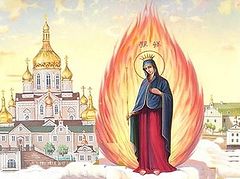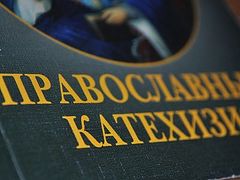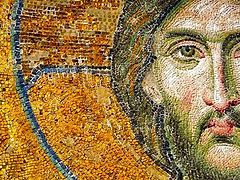Pochaev, Ukraine, December 1, 2017
The brethren of the great Holy Dormition Lavra in Pochaev, Ukraine have addressed a letter to His Holiness Patriarch Kirill and the hierarchs currently gathered in a session of the Council of Bishops of the Russian Orthodox Church, urging them to call for a new revision of the draft catechism prepared by the Synodal Biblical-Theological Commission, to fix several serious mistakes. The brotherhood’s letter has been posted on the monastery’s website.
The brotherhood also wrote a letter to the council, calling on the bishops to reject the documents that resulted from 2016’s Crete Council.
The idea of creating a modern catechism was first raised at the Bishops’ Council in 2008. The Biblical-Theological Commission, including prominent theologians, professors, and specialists in various theological fields, completed and adopted a first draft in January 2016. The February 2016 Council of Bishops meeting decided to forward the draft to the permanent members of the Holy Synod, the primates of the patriarchate’s autonomous Churches, the first hierarch of the Russian Orthodox Church Outside of Russia, the heads of Synodal institutions and theological schools, and diocesan bishops who expressed a desire to participate in reviewing the text. The latest version of the text was crafted with the input of those who have been reviewing the text.
The brothers begin by noting that the new catechism, published as a draft for Church-wide discussion in July, has caused a lively debate and discussion in Church circles, including theological conferences held in Moscow on October 8 and 20, in which the overwhelming majority of participants noted that the catechetical text contains much imprecise and ambiguous wording, unacceptable omissions, and sometimes direct distortions in its presentation of Orthodox dogma.
The Lavra brotherhood goes on to make 16 specific points in its letter, pointing to problematic places in the draft text of the catechism:
1. The text is called a “product of the conciliar mind of the Church,” though the identification of a small group of experts with the mind of the Church is an “unheard of innovation, having no precedent in the history of the Church,” and betraying an excessive amount of self-confidence, the brothers write.
2. The draft says much about ancient heresies, but does not give a clear evaluation of contemporary heresies, or of phenomena like schisms, the Unia, pseudo-religious sects, witchcraft, magic, appeals to evil spirits, or non-Christian religions.
3. Nothing is said about the most important ecclesiological issues—of the borders of the Church and the concept of heresy. The Orthodox Church’s attitude towards heresies and the possibility of salvation for heretics outside the Church are not addressed.
4. “The text attempts to reduce Holy Tradition of the status of Divine Revelation,” and mistakenly reduces it to the works of the Fathers and teachers of the Church. The true Orthodox view, as the Pochaev brothers write, included the acts of the councils, all the works of the saints, and all the received canons and theological texts.
5. The text makes a false distinction between what the saints wrote on behalf of the Church and what they wrote as theological opinions: “In fact, the practice of separating the words of the saints into those ‘spoke on behalf of the Church’ and all the rest existed neither in antiquity nor in recent centuries. The voice of the saints is the voice of the Church. Here there is an indirect borrowing of the Catholic principle of ex cathedra, which is unacceptable for Orthodox theology.”
6. Following on the previous point, the brothers point out that the saints of more recent centuries and the saints of antiquity breathed and wrote and preached by one and the same Holy Spirit. They also note that the concept of the “ancient Church” has no clear boundaries, and thus it becomes problematic to insist that all writings be judged against the “ancient Church.”
7. The text contains a “soteriological agnosticism”—the idea that we don’t know whether people of other faiths and atheists will enter the Kingdom of Heaven, whereas the Lord is very clear in Scripture and Tradition. The brothers see in this a desire to please the world, which ultimately destroys souls, including those who are meant to be pleased.
8. Following on the previous point, the brothers point to places in the text that could be interpreted as teaching the theory of universal salvation—that all will be saved.
9. Another point is made about the possibility of salvation for heretics and schismatics, emphasizing that salvation is impossible without repentance and union with Christ in His Church.
10. The text should “more clearly reflect the Orthodox doctrine on posthumous judgment and the trials, and the torments of sinners before the Last Judgment.”
11. The text states, “Over time, in accordance with the changing realities of the life of the Church and its relations with the outside world, some canonical determinations can be changed and adjusted in new canonical documents of the Church.” The brothers respond: “This judgment is contrary to the decision of the Ecumenical Councils, which are not subject to repeal or amendment, and therefore it is un-Orthodox and should be excluded from the text.”
12. The sections on Original Sin and redemption contain serious flaws, saying nothing about God’s punishment in response to the sin of Adam and Eve, but speaks of the necessity of death, which recalls the ancient doctrine of the heretic Pelagian.
Canon 120 of the Council of Carthage, which was later ratified by the Council of Trullo and the 7th Ecumenical Council, explicitly condemns the teaching that death is a natural necessity in man, rather than the result of sin.
13. The brothers suggest adding a section “On the Punishment of God,” as the text says nothing about it, “as if Holy Scripture and Holy Tradition teach nothing about it.”
14. The text presents a new Church teaching on the admissibility of second and third weddings by establishing a number of supposedly-acceptable reasons for a “Church divorce,” which, the brothers write, are actually uncanonical. Furthermore, the authors attempt to introduce conditions whereby a hierarch could nullify previously concluded Church weddings, “If the previous weddings were concluded before the couple’s conscious coming to the Church.” “The concept of a ‘conscious coming to the Church,’” the brothers write, “cannot be analogous to the one Baptism for the remission of sins.”
15. The text “Basic Principles of Attitude of the Russian Orthodox Church Towards the Non-Orthodox” is outdated and has received heavy criticism, and thus should not be included in the catechism. The brothers note that the non-Orthodox are increasingly straying from any semblance of Christianity, blessing all kinds of sin and abomination in some branches.
As previously reported, the “Basic Principles” document has raised great concern as it leaves no room to criticize the ecumenical activity of many hierarchs and clergy.
16. It is unacceptable for the catechism to use the word “marriage” for ceremonies that take place only at the civil registrar’s office, or other forms of cohabitation not blessed by the Church in the Mystery of Marriage. As St. Basil the Great writes in his 26th canon: “Fornication is not marriage, and not even the beginning of marriage.” Moreover, the catechism’s texts on divorce to not correspond to the sacred canons, the brothers write.
Given all the above, the Pochaev brotherhood arrives at four conclusions:
1. The Church does not need a new catechism, as it already has the “irreproachable” catechism of St. Philaret (Drozdov).
2. To adopt the draft of the catechism in its current form would cause a split in the Church.
3. The draft catechism needs serious revision.
4. Even after revision, the draft of the Catechism of the Russian Orthodox Church should not obtain the status of a doctrinal document, but be used as a reference material.
In connection with the above conclusion, the Lavra advises the Council of Bishops to make the following decisions:
1. Not to consider the draft catechism in its current form.
2. To task the Synodal Biblical-Theological Commission with preparing a new revision of the document, incorporating several changes, and to submit it to broad discussion afterwards.
3. To return to considering the draft text of the catechism only after serious revisions have been made and it has undergone widespread internal discussion.
The letter is signed “With love in the Lord” by His Eminence Metropolitan Vladimir of Pochaev, the Deputy Abbot of the Holy Dormition Pochaev Lavra, with the brethren of the holy habitation.




